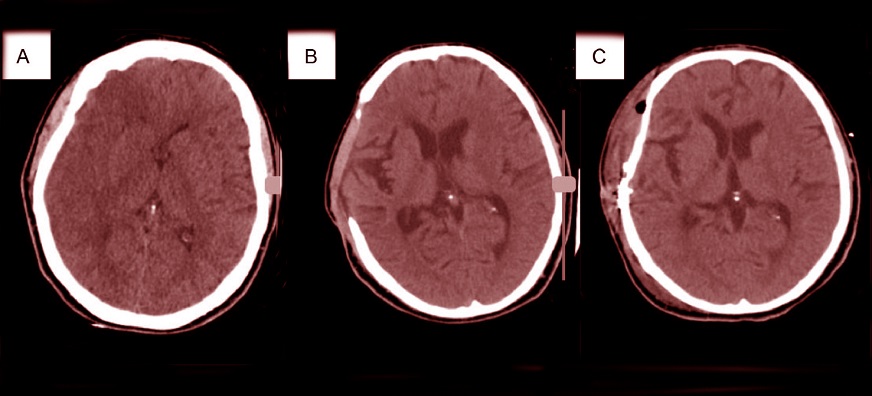Nikhil Prasad Fact checked by:Thailand Medical News Team Dec 25, 2024 3 months, 3 weeks, 5 days, 6 hours, 32 minutes ago
Medical News: Emerging Brain Infections in the Wake of the Pandemic
The COVID-19 pandemic has left an indelible mark on global health, affecting not only the respiratory system but also giving rise to a multitude of complications across other organ systems. Among these, a particularly rare and severe condition - subdural empyema - has emerged as a complication in some individuals recovering from the disease. This
Medical News report sheds light on three unusual cases, highlighting the intricate relationship between SARS-CoV-2 infection and subsequent brain infections.
 Cases of Subdural Empyema Among Patients Recovering from COVID-19
Cases of Subdural Empyema Among Patients Recovering from COVID-19
The study, conducted by researchers from Kashan University of Medical Sciences and Iran University of Medical Sciences, describes three cases of subdural empyema diagnosed in individuals with recent COVID-19 infections. Subdural empyema, a life-threatening condition, involves the accumulation of pus between the dura mater and the arachnoid mater in the brain. While typically associated with bacterial infections like sinusitis or mastoiditis, recent data suggests a potential link with SARS-CoV-2.
The Cases That Raised Questions
In one instance, a 17-year-old female patient presented with severe headaches, right-sided ptosis (drooping eyelid), and left-sided hemiplegia approximately 40 days after recovering from mild COVID-19. Her condition deteriorated rapidly, necessitating emergency neurosurgical intervention. Imaging revealed significant fluid collection and midline brain shift indicative of subdural empyema. Post-surgery, her symptoms gradually improved, though she experienced mild hemiparesis during follow-ups.
Another case involved a 41-year-old woman who had experienced COVID-19 two months prior. She reported a two-week history of debilitating headaches, fatigue, and neurological impairments. Her condition also required immediate surgical evacuation of the empyema. Imaging revealed extensive inflammation, and despite her critical condition upon admission, she showed marked recovery following treatment.
The third case concerned a 47-year-old man with epilepsy and a history of head trauma. He was admitted with fever, seizures, and headaches, and was later diagnosed with subdural empyema linked to prior COVID-19 infection. This patient’s surgical outcome was favorable, with no seizures reported after intervention, and inflammatory markers gradually normalized.
Understanding Subdural Empyema and Its Link to COVID 19
Subdural empyema is a rare but serious condition requiring swift diagnosis and intervention. Typically presenting with headaches, fever, and altered consciousness, the condition may progress rapidly, leading to severe neurological deficits or death. This study raises awareness about its occurrence following SARS-CoV-2 infection.
The exact mechanism by which COVID-19 predisposes individuals to subdural empyema remains unclear. Researchers hypothesize that immune dysregulation caused by the virus may create a conducive environment for bacterial infections. The patients describ
ed in this article had no prior history of head trauma or predisposing conditions that could explain the empyema, strengthening the hypothesis of a link to their prior COVID-19 infections.
Key Study Findings
The research provides valuable insights:
-Patient Characteristics: The individuals, aged 17 to 47, presented with varied neurological symptoms, including hemiplegia, ptosis, and severe headaches.
-Imaging Results: All patients underwent brain CT scans that revealed characteristic findings of subdural empyema, including extra-axial fluid collections and midline shifts.
-Treatment Outcomes: Emergency neurosurgical intervention proved crucial in all cases. Procedures included evacuation of pus, repair of dural defects, and post-operative antibiotic therapy.
-Recovery and Follow-Ups: Regular follow-ups over six months revealed significant clinical improvements, although mild complications like hydrocephalus and hemiparesis were noted in one case.
Broader Implications for Clinical Practice
This study emphasizes the importance of vigilance among healthcare professionals when treating post-COVID-19 patients. Subdural empyema, though rare, should be considered a potential complication in individuals presenting with severe neurological symptoms post-infection. Prompt imaging and surgical intervention are paramount to ensuring favorable outcomes.
Conclusion
Subdural empyema associated with COVID-19 represents a novel and concerning clinical challenge. The condition’s rarity underscores the need for heightened awareness among medical professionals. As these cases demonstrate, early detection and intervention are critical to preventing long-term neurological damage. Moving forward, additional research is necessary to understand the mechanisms underlying this association and to refine treatment protocols.
The study findings were published in the peer-reviewed journal: Radiology Case Reports.
https://www.sciencedirect.com/science/article/pii/S1930043324013438
For the latest COVID-19 News, keep on logging to Thailand
Medical News.
Read Also:
https://www.thailandmedical.news/news/covid-19-increases-disruptions-in-neurovascular-coupling,-inducing-endothelial-dysfunction-among-mild-cognitive-cases
https://www.thailandmedical.news/news/french-scientists-find-that-sars-cov-2-can-replicate-and-persist-in-the-brainstem-for-lengthy-periods
https://www.thailandmedical.news/news/covid-19-accelerates-brain-and-immune-aging
